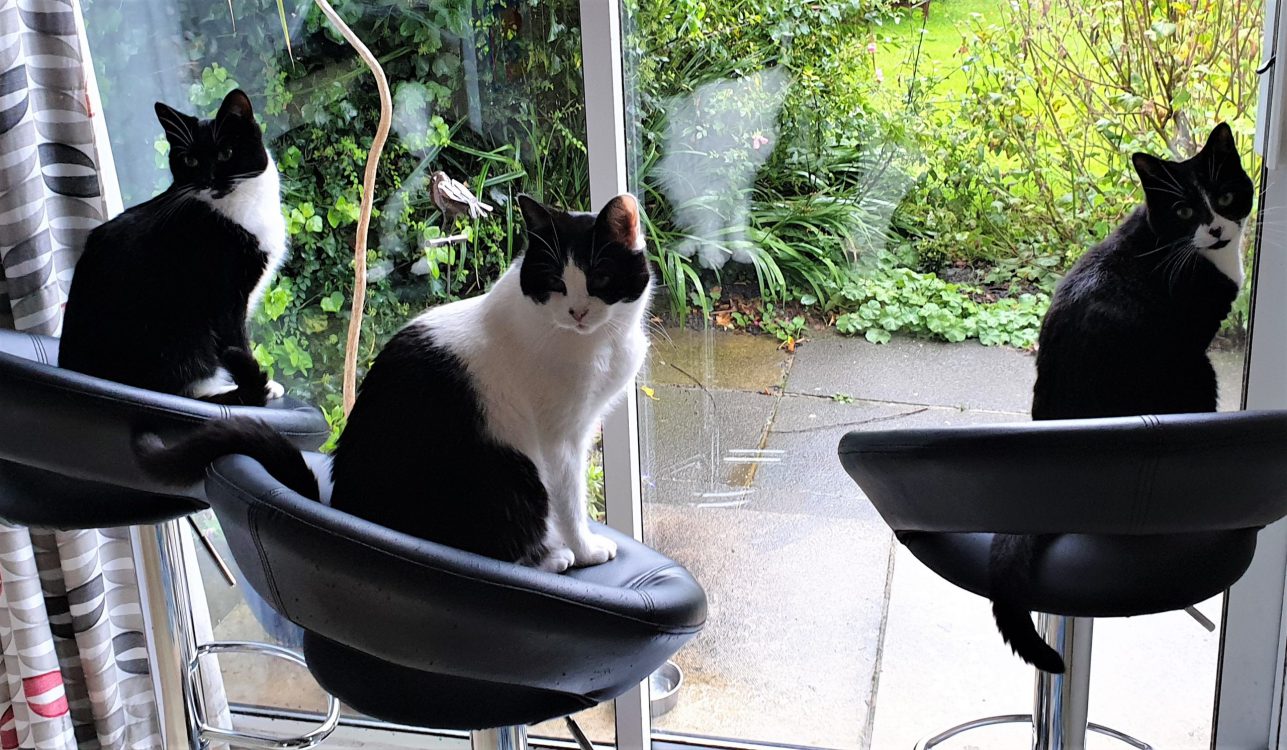
It’s that tired old question: Can a chubby moggy with a befuddling squint and an inflated ego actually become a great leader?
Working from home during lockdown has provided the perfect opportunity to really observe the behaviours of my three crazy cats – two sisters and their brother. They look and behave so differently. Pablo, the largest of the three, is the one with the squint.
On the surface, their day looks very much like a business operation where targets are set, and tasks need to be accomplished. Team cooperation has to be negotiated carefully.
One cat must act as a lookout in case a rival cat sneaks into the garden. A rota is required for visiting the litter tray. Sleeping arrangements need to be considered. Food and water must be allocated fairly. Book covers must be chewed, and toy mice are meticulously transported up the stairs and displayed neatly on the landing. What a busy day!
All these tasks are diligently completed on a daily basis. But which cat is in control? Who is the overall leader of the team ensuring that the operation runs smoothly?
Because of his size and bullying nature, Pablo believes that naturally he should be heading up the team. He chases the girls around the house to prove it. They feel intimidated and comply but more out of fear rather than with a glad heart. Not the best strategy to keep them motivated in the long run and get the best out of them!
Pablo’s telling management style is also paired with a lack of courage and acumen. At the slightest hint of a disturbance, he hides under the sofa and leaves the girls to face the threat by themselves.
Ill-judged decisions based on gut feeling – literally hunger –, rather than a rational assessment of the situation, often mean that he gets his head stuck inside shopping bags. And the result of this impulsive decision-making is that he wastes time trying to become unstuck. His frustration causes his squint to intensify, which in turn spooks the girls and delays the completion of vital tasks further. The overall team performance takes a dip.
Raven is bigger than her sister, Luna, and prefers to work alone. She is an individualist and definitely task-oriented. Pablo becomes aggravated when Raven endlessly explores new ways of stacking the toy mice but then leaves the finer details of the execution to him.
Her example does encourage the others to think outside the box. She is a free spirit and allows her fellow-felines the space to find their own innovative ways to complete a task; as long as they are all working towards the same goal.
However, her often inconsistent approach and her inability to set clear expectations can lead to confusion in the team. What is the correct way of bringing treasured hunting trophies into the house to trigger the best reaction?
Little Luna is blessed with the largest dose of cognitive ability of the three. She takes great pride in her work, although she is reluctant to delegate. She doesn’t trust Pablo to stay awake during his lookout duties and stands next to him at the window. She micromanages her team, and inspects their work to ensure that it meets her own high standards.
I am sure that we can pick up dejected meowing from the other two. In the end, they will often just walk away and take some time out in frustration. This temporarily halts productivity.
Perhaps none of our cats has the perfect attributes to naturally be a great leader? The work eventually gets done, more or less happily. Although, the traces of black and white fur on the carpet suggest that this does not always happen without conflict.
Maybe you recognise some of the trio’s leadership traits in yourself?
None of us are born as great leaders. People managers, like cats, come in different varieties each with their own unique characteristics, natural strengths and weaknesses, beliefs and experiences. People are complex. The key is to be self-aware and understand the impact that your own behavioural make-up has on the people around you and your preferred way of working.
Different teams require a different management approach. People are individuals and like to be managed as such. This may not always be in a way that comes naturally to you. To be an effective team leader, you need to be able to draw on the profound understanding of exactly what drives and motivates each individual on your team. Armed with that knowledge you can then build a strategically-aligned and cohesive team, so that you your team can reach their goals and you can concentrate on the bigger picture.
Easier said than done? Why not book a free 90-minute 1:1 Talent Strategy Session with one of our experienced PI Consultants to learn more about your own leadership style.
Your PI Consultant will also use the new and unique PI Team DiscoveryTM tool to compare your team’s strategic goals with its collective behavioural identity. This helps you visualise their strengths and blind spots. You will leave the session with some solid, clear and actionable recommendations to get the best out of any team?
Why not give it a go? You have nothing to lose and everything to gain.
Coming back to the cats, an increased self-awareness and personal development would perhaps encourage Raven to give clearer directions to the team, make Luna a better delegator, and help to remove the befuddle from poor Pablo’s squint.